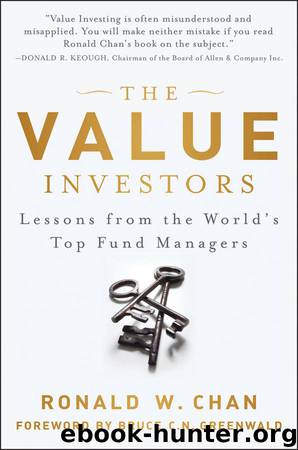The Value Investors by Ronald Chan

Author:Ronald Chan
Language: eng
Format: mobi, epub
Publisher: John Wiley & Sons, Ltd.
Published: 2012-07-10T04:00:00+00:00
Finding the Right Investment Culture
Looking back at Black Monday and its aftermath, Nutt pointed out that the general investment landscape in the United Kingdom remained positive. Retail savings continued to power ahead as the Thatcher administration promoted investments through various programs, such as the Personal Equity Plans (PEPs). The PEPs program, introduced in 1986, relieved investors of income and capital gains tax up to certain annual limits.
On top of PEPs, the government pushed for the privatization of state-owned enterprises throughout the 1980s, which encouraged every British citizen to participate in the stock market.
“If you look at the British market, it was generally bullish from the early 1980s to the late 1990s,” Nutt said. “For example, from 1982 to 1998, the FTSE Index had an annualized return of roughly 13 to 14 percent. After Black Monday, the index took about two years to recover, but since then it had continued to reach new heights.”
Thanks to his stellar performance at TSB, Nutt was approached by Fleming Investment Management in 1989. After managing that firm’s £2 billion fund for several years, Nutt joined Jupiter Asset Management in 1996, where he remains.
Having now been in the fund management business for more than 30 years, Nutt believes that to produce a sustainable investment record over the long term, a value fund manager has to find an investment workplace that shares his or her value investing mindset.
He explained, “You can’t get away from the fact that the stock market is a casino in the short term. As it is a common paradox that long-term returns are achieved by short-term targets, you can’t deny that many investment companies constantly aim for short-term results. I don’t like to treat the market like a casino, so I’d rather focus on the long term and have a buy-and-hold strategy. At the same time, it is important to find the right investment company that thinks the way you do.
“When it comes to value investing, my investment team and I believe that the difficult part lies not in finding out whether a stock is cheap or dear. We can always look at a business objectively and come up with a fair opinion about it. The more difficult part is that we never know if other investors are identifying the very same stock and thinking the same thing as us. In essence, determining how long it takes for an undervalued stock to perform is totally out of our control.
“Because of that, we never have a time horizon for our investments. We focus purely on valuation instead. Sometimes we exit an investment when its business has become fully matured or its business return begins to deteriorate. Sometimes we hold on to an investment for years because its value remains attractive. Investment exit, then, is never a timing exercise, but a valuation one.”
Nutt cited the example of the technology, media, and telecoms (TMT) boom in the late 1990s, a period of excessive valuation during which a number of traditional stocks were trading at only 4
Download
This site does not store any files on its server. We only index and link to content provided by other sites. Please contact the content providers to delete copyright contents if any and email us, we'll remove relevant links or contents immediately.
| Analysis & Strategy | Bonds |
| Commodities | Derivatives |
| Futures | Introduction |
| Mutual Funds | Online Trading |
| Options | Portfolio Management |
| Real Estate | Stocks |
Rich Dad Poor Dad by Robert T. Kiyosaki(6633)
Pioneering Portfolio Management by David F. Swensen(6301)
How To Win Friends and Influence People by Dale Carnegie(4513)
The Money Culture by Michael Lewis(4207)
The Dhandho Investor by Mohnish Pabrai(3765)
The Wisdom of Finance by Mihir Desai(3748)
Liar's Poker by Michael Lewis(3449)
Fooled by Randomness: The Hidden Role of Chance in Life and in the Markets by Nassim Nicholas Taleb(3124)
The ONE Thing by Gary Keller(3071)
Mastering Bitcoin: Programming the Open Blockchain by Andreas M. Antonopoulos(3045)
The Intelligent Investor by Benjamin Graham Jason Zweig(3041)
The Psychology of Money by Morgan Housel(3036)
Rich Dad Poor Dad: What The Rich Teach Their Kids About Money - That The Poor And Middle Class Do Not! by Robert T. Kiyosaki(2958)
Investing For Dummies by Eric Tyson(2954)
How to Day Trade for a Living: Tools, Tactics, Money Management, Discipline and Trading Psychology by Andrew Aziz(2949)
How to Win Friends and Influence People by Dale Carnegie(2915)
Market Wizards by Jack D. Schwager(2701)
How to Pay Zero Taxes, 2018 by Jeff A. Schnepper(2655)
Zero Hour by Harry S. Dent Jr. & Andrew Pancholi(2649)
